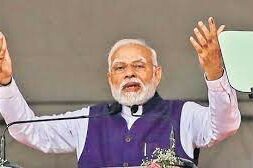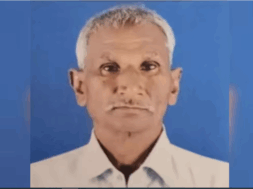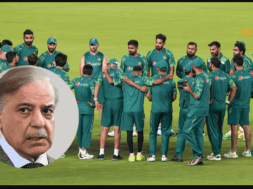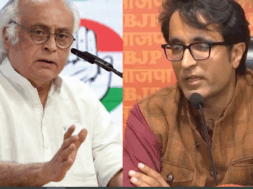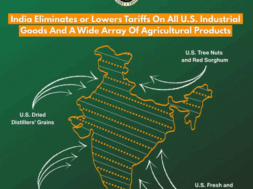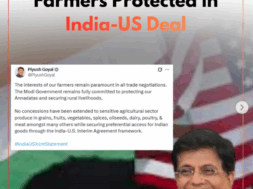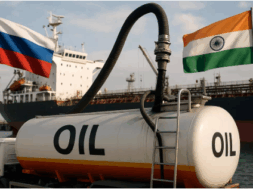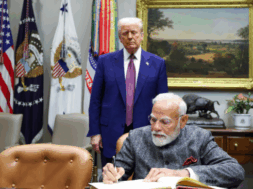
World’s Perception about “Hungry India” has Changed to a “Billion People of Aspirational Minds and Skilled Hands:” Modi
Manas Dasgupta
NEW DELHI, Sept 3: The Prime Minister Narendra Modi on Sunday said the world’s perception about India was changing from a billion of hungry people to a billion of aspirational minds and skilled hands.
In a long interview a week before the two-day G-20 Summit under India’s presidency in New Delhi from September 9, Modi said India would be a developed nation when it celebrates 100 years of Independence where there would be no place for corruption, casteism and communalism.
Modi said “For long, India was seen as a country of one billion hungry stomachs. Now it is one billion aspirational minds, two billion skilled hands and hundreds of millions of young people.” The Prime Minister said India’s population can enable it to reap a massive demographic dividend over the next few decades. “Indians today have a great chance to lay the foundation for growth that will be remembered for the next 1,000 years,” he said. “Once seen simply as a large market, India now part of solutions to global challenges,” he added.
Speaking about the upcoming G20 summit in New Delhi, the Prime Minister said the world now looks to India for guidance. “Our words and vision are seen by the world as a roadmap for the future and not merely ideas,” he said. The world’s GDP-centric view is changing to a human-centric one, and India is playing the catalyst in this transformation, the Prime Minister said.
India’s G20 Presidency has also sowed seeds of confidence in countries of the so-called Third World, the Prime Minister said. Amid the countdown for G20, the government has been underlining the role Third World countries — or Global South — will be playing in growth worldwide in the coming years. The Prime Minister has voiced the concerns and issues of Global South on several international fora.
The Prime Minister said India’s domestic approach to address the most backward people also guides it at a global level as it voices the concerns of those neglected in the geopolitical landscape. “The theme of India’s G20 Presidency ‘Vasudhaiva Kutumbakam’ is not just a slogan, but a comprehensive philosophy derived from our cultural ethos,” he said.
The U.S. President Joe Biden, Japanese Prime Minister Fumio Kishida, British Prime Minister Rishi Sunak, Saudi Arabia’s King Mohammed bin Salman and other leaders will gather at the newly-constructed Bharat Mandapam conference hall on September 9-10 for the pre-eminent annual meeting of developing and developed countries.
“Many positive impacts are coming out of India’s G20 Presidency. Some of them are very close to my heart,” Mr. Modi said. G20 accounts for 85% of the global GDP, 75% of international trade and 65% of the world population. India took over the G-20’s presidency from Indonesia last November, and will hand over to Brazil in December. Modi said while it was true G20 was an influential grouping in terms of its combined economic might, “a GDP-centric view of the world is now changing to a human-centric one”, and just as a new world order was seen after World War 2, a new world order is taking shape post-Covid.
“The shift to a human-centric approach has begun globally and we are playing the role of a catalyst. India’s G20 Presidency has also sowed the seeds of confidence in the countries of the so-called Third World,” he said.
On a question on the position India took on the Russia-Ukraine war, the Prime Minister reiterated that dialogue and diplomacy are the only way to resolve conflicts.
India’s refusal to side with any camp and consistently advocate dialogue during the Ukraine conflict had sparked criticism from some quarters. Some voices in the West had also slammed India’s decision to buy fuel from Russia even after the Vladimir Putin dispensation faced sanctions from Europe and the US. India has firmly defended its decision, with External Affairs Minister Dr S Jaishankar saying that every country was trying to get the best possible deal for its citizens and India was no different. “Whether as G20 President or not, we will support every effort to ensure peace across the world,” the Prime Minister said.
While answering a question about the global debt crisis — which he noted is “a matter of great concern, especially (for) developing countries” — Mr. Modi took a dig at freebies given by some state governments in India, and stressed on the need for financial discipline.
“Populism may give political results in the short term but will extract a great social and economic price in the long term. Those who suffer the consequences the most are often the poorest and the most vulnerable,” he said.
The Prime Minister also made a strong pitch for United Nations reforms in line with the changing realities of the world and to ensure representation of voices that matter, saying a mid-20th century approach cannot serve the world in the 21st century. Modi also said India backed inclusion of the African Union as a full member of the G20 as no plan for the future of the planet can be successful without the representation and recognition of all voices.
“By the time India became the president of G20, our words and vision for the world were not being taken merely as ideas but as a roadmap for the future.” In a new dimension to the G20, its ministerial and other meetings were held not just in the capital New Delhi but in all parts of the country, including second and third-tier cities such as Indore and Varanasi. More than one lakh delegates met for some 200 sectoral meetings, many in tourist destinations such as Hampi, Kerala, Goa and Kashmir.
“They have been going to different regions, witnessing our demography, democracy and diversity. They are also seeing how a fourth D, development, has been empowering the people over the last decade. There is a growing understanding that many of the solutions that the world needs are already being successfully implemented in our country, with speed and scale,” Modi said. Many countries have been watching our growth story very closely and are convinced that this progress is not an accident but is happening as a result of a clear, action-oriented roadmap of ‘Reform, Perform, Transform’, he said.
For a long time in world history, India was one of the top economies of the world but later, due to the impact of colonisation of various kinds, our global footprint was reduced, he added. “But now, India is again on the rise. The speed with which we jumped five spots, from the 10th largest economy to the fifth largest in less than a decade has conveyed the fact that India means business!” he added.
